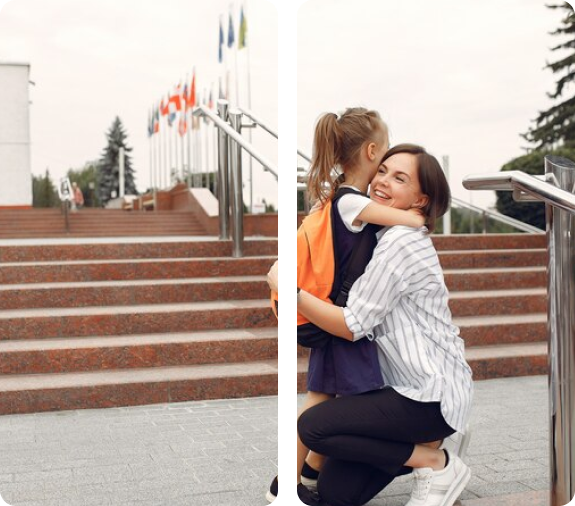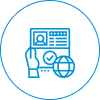Germany
Learning German can be a rewarding experience! it opens doors to rich cultural, historical, and professional opportunities .


What is an Au Pair?
An au pair is a young adult, usually under 25, who lives with a German family and provides childcare in exchange for free room and board, plus a small allowance.
Who Can Be an Au Pair in Germany?
Young people from around the world can become au pairs in Germany to learn German and prepare for future studies or careers. You can apply after completing school (if you’re at least 18), during or after college.
What are the Responsibilities of an Au Pair in Germany?
The primary responsibility of an au pair is to care for children. This typically involves supervising playtime, taking children to and from kindergarten, and assisting with light housework related to childcare. While you may be asked to help with household chores, your main focus should be on childcare.

How Long Does an Au Pair Assignment Last?
Young people from around the world can become au pairs in Germany to learn German and prepare for future studies or careers. You can apply after completing school (if you’re at least 18), during or after college.
How Do Au Pairs Live with Host Families?
Au pairs are considered temporary family members rather than employees. They receive a contract, a small allowance, and their own room for privacy. The mediating agency and German laws protect au pairs’ rights. Host families who are interested in hosting an au pair and can afford it typically offer attractive living arrangements. While au pairs may not always live in big cities, they can expect comfortable accommodations.

How Much Can You Earn as an Au Pair?
Au pairs receive free food, accommodation, insurance, and a language course (up to €50 per month). Additionally, they earn €260 per month in pocket money.
The German Au Pair program officially sets the monthly salary at €280. Host families must contribute €840 per year (or €70 per month) towards the au pair’s language course. This may fully cover the course cost, but the au pair might need to pay the difference.
Working Hours
Au pairs work a maximum of 30 hours per week, including babysitting, and no more than 6 hours per day. They should have at least 4 evenings and 1.5 days off per week. Non-EU au pairs cannot hold other jobs while in Germany.
Time Off and Holidays
Au pairs in Germany are entitled to at least 1.5 days off per week and 4 evenings off, including one Sunday per month. For a one-year stay, they have four weeks of vacation. Shorter stays have two days off per working month.
Alternatives to Au Pair
If you want to live in Germany, consider starting an apprenticeship, studying, or working.

Au Pair Eligibility Checklist
- Citizenship : Any nationality is eligible.
- Visa : Not required for application. You can apply for a visa after receiving a contract.
- Age : Between 18 and 27 years old
- Language : Basic German language skills (A1 level). Non-EU applicants may need to demonstrate language skills during a visa interview.
Your Path to Becoming an Au Pair in Germany

Finding a Host Family
The next step is to find a suitable host family. You can use an au pair agency, online resources, or personal connections. Communicate with potential families to ensure compatibility.

Applying for a Visa
Non-EU citizens need a visa to enter Germany as au pairs. Apply at the German embassy or consulate in your home country. You'll need a passport, invitation letter, and health insurance.

Registering with Local Authorities
Within two weeks of arriving in Germany, register with the local authorities (Ausländerbehörde). This is mandatory for all residents. Bring your passport, visa, and rental agreement.

Attending a Language Course
As an au pair, you must take a German language course. Your host family will help you enrol. The course fee is €70 per month, partially covered by the host family. Travel costs are also covered.

Signing a Contract
Before starting your au pair duties, sign a contract with your host family. The contract should outline working hours, days off, and the monthly allowance. Read the contract carefully and ask questions if needed.

Requirements to get a visa in Germany
- Passport
- Au Pair contract
- Appointment and visa application form
- German certificate
- Motivation letter
- Invitation letter
- Health insurance
- Birth Certificate (Being 18 to 26 year old)
What If You're Unhappy as an Au Pair?
While being an au pair in Germany can be rewarding, challenges may arise. If you’re dissatisfied with your host family, Germany, or the childcare role, here are some options:
-
Communicate with Your Host Family
Openly discuss your concerns with your host family. A mediator, like your au pair agency, can help facilitate the conversation. Aim for a mutually beneficial solution. If unsuccessful, your agency can assist in finding a new family. -
Connect with Other Au Pairs
Sharing experiences and seeking advice from other au pairs can be helpful. Online forums and groups provide opportunities for connection. -
Prioritise Self-Care
Take time for yourself to engage in activities you enjoy. Germany offers plenty of outdoor and cultural opportunities for relaxation and enjoyment. -
Consider Changing Your Program
If childcare isn't the right fit, explore other options like language courses or study programs within Germany. -
Seek Professional Help
If you're struggling with mental health, seek professional help. Germany has excellent healthcare services, including therapists and counsellors who speak various languages. -
Return Home Country
If none of the above options work, consider returning to your home country. Consult your agency for guidance on ending your program early.
Options After Your Au Pair Program in Germany
Completing an au pair program in Germany offers valuable international experience, language learning, and cultural immersion. Here are some options for your next steps

Extend Your Stay
If you enjoy your time in Germany, consider extending your stay. Explore options like a job seeker visa (up to six months) or a student visa for language courses or study programs.

Travel Europe
Germany's central location makes it a great starting point for exploring Europe. Visit neighbouring countries like France, Italy, and Spain. Budget airlines offer affordable travel to destinations like Greece and Turkey.

Continue Your Education
Germany's excellent education system provides numerous opportunities. Consider language courses, study programs, dual study programs, vocational training, or apprenticeships.

Work in Germany
To work in Germany, you'll need a work visa. Secure a job offer from a German employer or meet qualifications in a high-demand field. Note that finding a job can be challenging without fluent German.

Volunteer in Germany
Give back to the community and gain valuable experience by volunteering. Choose from various opportunities like working with refugees, animals, or environmental organisations. Consider FSJ, FÖJ, or BFD programs for language improvement and social connections.

Return to Your Home Country
Use the skills and experiences gained in Germany to enhance your resume and job prospects. Stay connected with your host family and continue practising German.
Ausbildung in Germany
Vocational Training in Germany: A Dual Education System
Vocational training in Germany, also known as dual education, combines classroom learning with practical experience in a chosen field. This system is highly respected for its ability to launch successful careers.
High Demand for Skilled Workers
There’s a significant demand for skilled workers in Germany, with over 327 occupations requiring formal training. Despite around 500,000 open positions annually, many remain unfilled, especially in nursing, hospitality, and other service sectors. This presents excellent opportunities for foreign applicants seeking apprenticeships.
Duration and Requirements
Vocational training typically lasts between two and four years, with apprenticeships ranging from 24 to 36 months. German language skills at the B2 level are essential, as classes will be conducted entirely in German. During training, you’ll be employed by a German company with the same rights and obligations as German nationals.
Job Prospects
A vocational training in Germany provides you with a German qualification as a skilled worker. Given the high demand, there’s a strong likelihood of continued employment with your training company. This also opens doors for long-term legal residence in Germany.
Earnings
During vocational training, your gross monthly salary can range from €800 to €1,200 (approximately $885 to $1,350). The exact amount depends on your employer, region, and qualifications. Additional benefits like affordable housing and paid vacation make it even more attractive. Post-apprenticeship, you can expect a gross monthly salary of around €2,400 to €3,500 (approximately $2,650 to $3,850), depending on various factors.
Road map to Germany
- Enrol at Great Lessons : Checking your conditions and consulting you about the required documents
- Primary Documentation : Setting a timetable for preparing, translating, and verifying documents at the German embassy
- Anerkennung Process :Arranging and sending out your documents and doing the administrative process to obtain the recognition (Anerkennung) for your documents
- Employer Interview : Arranging a meeting with German employers and preparing and practising with our clients before the final interview with employers.
- Recognition & Employer Contract : Obtaining approval from the German Labor Office. The Employer contract will be issued if the candidate successfully completed the interview.
- Visa Application : Arranging an appointment at the German Embassy and preparing your documents for the interview
- Visa approval : Collect visa, book the ticket and travel insurance
Post arrival Services at Germany
- Coordination of airport pick up, accommodation
- Make an appointment at the residence office, and we will help you register in the city
- Applying for conversion of initial visa to work visa
- Register for Insurance
- Guidance for basic everyday life
- Make an appointment and guidance for opening a bank account

FSJ (Voluntary Service Year) Program
The Federal Voluntary Service (FSJ) is a one-year program for individuals aged 17 to 27 who have completed high school. It offers young adults the opportunity to explore their vocational or academic interests while contributing to society.
FSJ participants gain legal status similar to apprentices (Ausbildung) and have the chance to learn about Germany’s social services sector, improve their German language skills, and acquire valuable professional and philanthropic experience.
Eligibility:
- Completed high school education
- Maximum age of 27
- Basic German language knowledge
FSJ in Nursing
FSJ programs in nursing are available in most major German cities, including Berlin, Munich, Cologne, Hanover, and Hamburg. Smaller towns often offer lower living costs.
Job opportunities in the nursing field
- Hospitals
- Retirement homes
- Mobile care services
- Child care
- Personal assistance for people in need of care
FSJ in Germany for applicants from abroad
A prerequisite for international applicants is that they already have German language skills, if possible German at level B1. Applicants who are not from the European Union must also note that a visa is required. Applicants who are older than 27 may be eligible for the BFD.
Facts and Figures About FSJ in Germany
- Annual Positions: Over 90,000 FSJ positions are available each year.
- Monthly Allowance: Participants can receive a monthly allowance of up to €402.
- Funding: The Federal Ministry for Family Affairs, Senior Citizens, Women, and Youth supports and funds FSJ programs
- Benefits: FSJ offers valuable work experience and skill development.
- Further Education: Approximately 40% of FSJ participants continue their studies after completing the program.
- Popular Fields: Social work, education, and healthcare are among the most popular FSJ areas in Germany.
Roadmap to Germany for the FSJ Program
- Register with Great Lessons: Submit all necessary documents. Upon verification, your registration will be confirmed via email.
- Online Interview Preparation: Receive a day of online interview preparation.
- Mock Interviews: Participate in mock interviews with German representatives to assess your suitability. Selected candidates will proceed to employer interviews.
- Employer Interview: Conduct an online interview with the German employer. Successful candidates will be notified via email.
- Contract: The employer will provide a detailed contract outlining program information, pocket money, insurance, and company details.
- Prepare Documents: Have the required certificates ready for the visa process.
- Blocked Account: Deposit approximately Rs. 4 lakhs into a blocked account as per the employer's instructions.
- Visa Application: The employer will submit a visa application online, including copies of necessary documents and the contract.
- Embassy Interview: After document verification, you'll schedule an embassy interview. Bring original copies of required documents.
- Visa Approval: Based on the submitted documents, you'll receive a visa. Prepare for your trip with travel tickets and insurance.

Documents required for registration
- SSLC
- Plus Two (Science Only)
- B2 Module Certificate( 2 / 3 )
- Passport
- Birth Certificate
What Comes After FSJ?
3Non-EU citizens should be aware that staying in Germany for work after an FSJ can be challenging. Many participants struggle to achieve the necessary German language proficiency and secure a follow-up job. We recommend exploring vocational training as an alternative.
Vocational training in Germany offers higher earnings than FSJ and significant improvements in technical skills. This makes graduates highly sought-after in the job market.
Vocational training programs combine theoretical knowledge from trade schools with practical experience in companies. Unlike FSJ, these programs provide structured vocational training.
FAQ
You will receive at least 360 euros per month (at least 320 euros pocket money plus 40 euros allowance for meals). Some places also pay more. You have to negotiate this with the provider of the FSJ position.
With an FSJ you can get socially involved in Germany and do good. You can develop professionally and personally. Many people make contact with employers during their FSJ and then decide to take up vocational training or dual studies with this employer. You can also improve your language skills and use the time for general orientation in Germany.
Search for suitable positions on Arbeitsagentur.de and apply directly. You can also search for suitable positions via Google. You can also subscribe to our newsletter: You will then always receive current advertisements for FSJ positions.
An FSJ usually starts in the fall (August 1 or September 1). Some providers also offer other starting dates. You should note that you can apply at any time – even well before these dates. The duration of the FSJ is usually one year.
You can do a Voluntary Social Year (FSJ) or Voluntary Ecological Year (FÖJ), for example, in child and youth work, in health and elderly care, in sports clubs, in cultural institutions and schools. It is also possible in the field of environmental protection and nature conservation, in landscape conservation and monument preservation. Other areas are also possible.
Of course, the FSJ is open to women, men, and people who classify themselves differently.
Work at Germany
There is a series of steps you need to take as a nurse who already has at least two years of experience to immigrate to Germany; here is an overview of the steps you need to take
1 . Required Documents for Nursing Applications in Germany
To begin your application, please gather the following documents:
- Passport or personal identification card
- Diploma, bachelor's certificate, and transcripts
- CV or resume detailing your education, training, and work history
- Proof of the duration of your nursing training from the school or training centre
- Evidence of the theoretical and practical subjects studied, along with the number of hours per subject, and proof of clinical internships in various departments
- Documentation of the type and scope of your final examination, including oral, written, and practical components
- References or other evidence of work experience in nursing
- Certificates of any additional training or certifications
- Certificate of Good Standing or Certificate of Current Professional Status
Additional Documents:
- Marriage certificate or family register if your name has changed
- A criminal record check
- Depending on the specific patient or the state you are applying to, additional documents may be required.
Note: The exact checklist of documents may vary based on individual circumstances and the specific state or authority you are applying to. Candidates who sign a contract with us will receive a detailed checklist tailored to their situation and preferred state.
2 . Get the documents translated into German
Before sending your documents to the competent authority, you need to get them translated into German to get approval from the German embassy.
3 . Get approval for the correctness of the translated documents from the German embassy
Before submitting your translated documents to the German embassy, you must obtain their approval to confirm the accuracy of the translations. Once approved, schedule an appointment with the embassy to submit the required documents. Please note that the processing time for document verification is approximately one week. After the documents are approved, they can be sent to Germany for the recognition process to begin.
4 . Recognition Process for Nursing Qualifications in Germany
If you are a qualified nurse seeking to have your credentials recognized in Germany, you must go through the recognition process. This involves submitting your required documents and qualifications to the relevant authorities. After a review period of typically 1 to 4 months, you will receive a decision on whether your qualifications are equivalent to German nursing standards.
For more detailed information about the recognition process, including the required documents and potential questions, please refer to our comprehensive guide on “Recognition (Anerkennung).”
Once you sign a contract with us, we will provide you with a personalised checklist and timeline for submitting the necessary documents based on your specific circumstances.
5 . Job Interview and Offer Letter
Once you receive the recognition decision (Bescheid), the next step is to secure a job offer from a German employer. You can actively search for job openings yourself or utilise the services of a job-finding agency.
It’s important to note that interviews are typically conducted in German, so fluency in the language is highly recommended. While a language certificate is not strictly required at this stage, it’s advisable to prepare for the interview and obtain the certificate later in the process, which is necessary for obtaining a visa.
Great Lessons candidates will receive comprehensive interview preparation, including a list of common questions and practice sessions with our experts. This will help you build confidence and address any weaknesses in your German language skills before the actual employer interview.
6 . Federal Employment Agency Approval
Even after obtaining a job contract, you must still receive approval from the Federal Employment Agency. This agency will assess your qualifications and working conditions to ensure they meet German nursing standards. This process typically takes 1-2 months.
7 . Visa Application
Non-EU residents must apply for a visa. Once you have all the necessary documents, schedule an appointment at the German embassy to submit your visa application. The standard processing time for visa assessments is 4-6 weeks. However, Monarch’s clients may be eligible for expedited appointments, potentially reducing processing time to less than two weeks.
8 . Visa Collection
Upon completion of the document assessment, you will receive an email from the embassy notifying you that your visa is ready for collection.
9 . Travel Arrangements
The final step before departing for Germany is to book your flight and accommodation. We can assist you with these arrangements.
What can we do for you?
1 . Services in Your Home Country
- Assess your eligibility and provide guidance on required documents.
- Arrange meetings with potential German employers.
- Prepare and practise for interviews with German employers.
- Create a timeline for document preparation, translation, and verification at the German embassy.
- Organise and submit your documents and handle the administrative process for recognition of your qualifications.
- Obtain approval from the German Labor Office.
- Schedule an appointment at the German embassy and prepare your documents for the interview.
- Assist with visa collection.
- Help you find suitable accommodation and book your flight to Germany.
2 . Services in Germany
- Assess your eligibility and provide guidance on required documents.
- Apply to convert your initial visa to a work visa.
- Register for health insurance.
- Assist with scheduling an appointment and providing guidance for opening a bank account.
What Comes After FSJ?
3Non-EU citizens should be aware that staying in Germany for work after an FSJ can be challenging. Many participants struggle to achieve the necessary German language proficiency and secure a follow-up job. We recommend exploring vocational training as an alternative.
Vocational training in Germany offers higher earnings than FSJ and significant improvements in technical skills. This makes graduates highly sought-after in the job market.
Vocational training programs combine theoretical knowledge from trade schools with practical experience in companies. Unlike FSJ, these programs provide structured vocational training.
Requirements for Applying as a Nurse in Germany
To successfully apply for a nursing job in Germany and immigrate, you must meet the following key requirements:
- Nursing Degree : A bachelor's degree (or higher) in nursing
- Work Experience : At least two years of relevant work experience, including practical training
- German Language Proficiency : A B2 level German language certificate
By fulfilling these requirements, you can begin the immigration process. While it’s recommended to be fluent in German for interviews, you can obtain the language certificate before applying for a residency visa.
Nursing Salaries in Germany
Nurses in Germany enjoy competitive salaries, ranging from 3000 to 5500 euros per month. This makes nursing one of the highest-paid professions in Germany and allows for a comfortable standard of living. Your salary may vary based on factors like work experience and location, but overall, nursing offers excellent earning potential.
Work Experience and Salary
If you lack relevant work experience or encounter difficulties in validating your documents, you may start as a nurse in Germany with a one-year experience requirement. In this case, your initial salary may be lower, ranging from 2830 to 3000 euros. However, your salary will increase with additional years of experience.
FAQ
This issue may concern many of you, but fortunately, the answer is YES. If you wish to bring your family to Germany while working as a nurse in Germany, you can easily apply for a family reunion visa for your spouse and children (under the age of 18). Later on, your family can apply for a Residence Permit and the EU Blue Card in Germany, as well.
There is no age limit for nurses for immigration to Germany, but preferably, people should act before the age of 40. (If a person can present a language certificate before the age of 45, there will be no problem with immigration, otherwise, the immigration conditions will be risky)
Nursing Ausbildung is actually internship courses in the form of Dual Vocational Training (DVT) where the apprentice attends a Vocational School or College and works at the same time, earning a regular income in the process. After completing the 3-year course, the person can easily enter the work market.
For people who are interested in nursing in Germany, this is one of the best options to start this career.
Nursing Ausbildung is actually internship courses in the form of Dual Vocational Training (DVT) where the apprentice attends a Vocational School or College and works at the same time, earning a regular income in the process. After completing the 3-year course, the person can easily enter the work market.
For people who are interested in nursing in Germany, this is one of the best options to start this career.
If you are wondering whether your university or college degree is valid in Germany, you can easily use the “Anabin” database. If you have completed university studies already, you can find out how your certificate will be evaluated in Germany, and whether you can apply with your previous qualifications, or you should start with a nursing Ausbildung in Germany.
In general, Anerkennung means recognition, but, in this case, recognition means that a foreign professional qualification is legally equivalent to a German professional qualification. In this case, if you are fully recognized in Germany as a nurse, you can work with your previous nursing qualifications in Germany.
How to Get a Doctor Job in Germany?
Documents Required
- Medical Degree : A valid medical degree from a recognized university.
- Transcript : A complete transcript of your medical studies.
- Licence : A medical licence from your home country.
- Language Proficiency : A B2 or C1 level German language certificate (e.g., Goethe-Zertifikat, TestDaF).
- CV and Cover Letter : A comprehensive CV and a tailored cover letter highlighting your qualifications and experience.
- References : Letters of recommendation from previous employers or professors.
- Police Clearance Certificate : A police clearance certificate from your home country.
- Health Certificate : A health certificate confirming your physical and mental fitness.
Process of the Procedure
- Language Proficiency : Obtain a B2 or C1 level German language certificate.
- Document Verification : Have your medical degree and transcripts verified by a German academic institution.
- Job Search : Start searching for job openings in German hospitals or clinics.
- Application : Submit your application, including your CV, cover letter, and required documents.
- Interviews : If shortlisted, participate in interviews with potential employers.
- Job Offer : If successful, you will receive a job offer.
- Visa Application : Apply for a work visa at the German embassy in your home country.
- Arrival and Registration : Upon arrival in Germany, register with the local authorities.
- Licence Recognition : Apply for the recognition of your medical licence in Germany.
Other Requirements
- Medical Insurance : Obtain health insurance coverage in Germany.
- Registration : Register with the German Medical Association (Bundesärztekammer).
- Adaptation : Be prepared to adapt to the German healthcare system and cultural differences.
Salary
Doctor salaries in Germany vary depending on factors such as specialty, experience, and location. However, doctors in Germany generally enjoy competitive salaries and good working conditions.
Additional Tips
- Networking : Build connections with German doctors and healthcare professionals.
- Research : Learn about the German healthcare system and specific medical specialties.
- Preparation : Thoroughly prepare for interviews by researching common questions and practising your German.
- Patience : The process of obtaining a doctor job in Germany can take time.
How to Become a Physiotherapist in Germany?
Documents Required
- Physiotherapy Degree : A recognized physiotherapy degree from a university.
- Transcript : A complete transcript of your physiotherapy studies.
- Language Proficiency : A B2 or C1 level German language certificate (e.g., Goethe-Zertifikat, TestDaF).
- CV and Cover Letter : A comprehensive CV and a tailored cover letter highlighting your qualifications and experience.
- References : Letters of recommendation from previous employers or professors.
- Police Clearance Certificate : Police Clearance Certificate
- Health Certificate: A health certificate confirming your physical and mental fitness.
Process of the Procedure
To become a physiotherapist in Germany, you must first obtain a B2 or C1 level German language certificate and have your physiotherapy degree and transcripts verified by a German academic institution. Then, actively search for job openings and submit your application, including your CV, cover letter, and required documents. If selected, participate in interviews with potential employers and secure a job offer. Once you have a job offer, apply for a work visa at the German embassy in your home country. Upon arrival, register with the local authorities and apply for the recognition of your physiotherapy licence. Additionally, you will need to obtain health insurance coverage, register with the German Physiotherapy Association, and be prepared to adapt to the German healthcare system and cultural differences.
Other Requirements
- Medical Insurance : Obtain health insurance coverage in Germany.
- Registration : Register with the German Physiotherapy Association (Zentralverband der Physiotherapeuten).
- Adaptation : Be prepared to adapt to the German healthcare system and cultural differences.
Salary
Physiotherapist salaries in Germany vary depending on factors such as experience, location, and specialisation. However, physiotherapists generally enjoy competitive salaries and good working conditions.
Caregiver Opportunities in Germany
Opportunities
Germany offers a growing demand for caregivers due to its ageing population. Caregivers play a crucial role in providing assistance to elderly individuals, people with disabilities, and those recovering from illnesses or injuries. Opportunities abound in various settings, including:
- Nursing Homes : Caring for elderly residents in long-term care facilities.
- Home Care : Providing in-home care services to individuals who prefer to remain independent in their own homes.
- Hospitals : Assisting patients in hospital settings.
- Rehabilitation Centers : Supporting individuals undergoing rehabilitation programs
Application Process
- Language Proficiency : Demonstrate proficiency in German, typically at a B2 level or higher.
- Document Verification : Have your caregiver qualifications verified by a German academic institution.
- Job Search : Explore job listings on online platforms, employment agencies, or directly through healthcare facilities.
- Application : Submit your application, including your CV, cover letter, and required documents.
- Interviews : If shortlisted, participate in interviews with potential employers.
- Job Offer : If successful, you will receive a job offer.
- Visa Application : Apply for a work visa at the German embassy in your home country.
- Arrival and Registration : Upon arrival in Germany, register with the local authorities.
- Licence Recognition : Apply for the recognition of your caregiver qualifications in Germany.
Documents Required
- Caregiver Qualifications : A recognized caregiver certificate or diploma.
- Transcript: A complete transcript of your caregiver studies.
- Language Proficiency : A B2 or C1 level German language certificate.
- CV and Cover Letter : A comprehensive CV and a tailored cover letter highlighting your qualifications and experience.
- References : Letters of recommendation from previous employers or supervisors.
- Police Clearance Certificate : A police clearance certificate from your home country.
- Health Certificate : A health certificate confirming your physical and mental fitness.
Salary
Caregiver salaries in Germany vary depending on factors such as experience, qualifications, location, and the type of care provided. However, caregivers generally enjoy competitive wages and benefits.
Additional Considerations
- Cultural Adaptation : Be prepared to adapt to German culture and healthcare practices.
- Networking : Building connections with other caregivers and healthcare professionals can be beneficial.
- Continuing Education : Consider pursuing additional training or certifications to enhance your skills and career prospects.
Conclusion
Germany offers promising opportunities for caregivers. By following the application process, meeting the necessary requirements, and adapting to the German healthcare system, you can build a rewarding career as a caregiver in this dynamic country.
